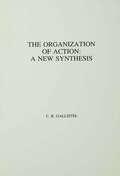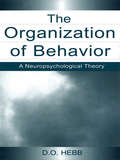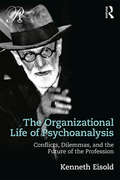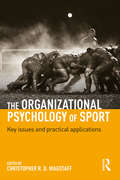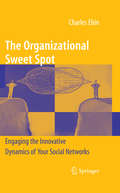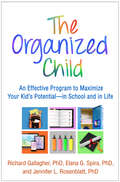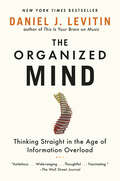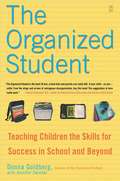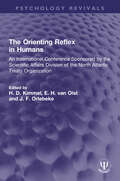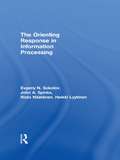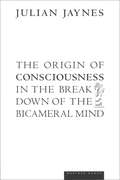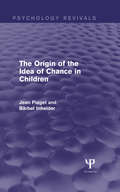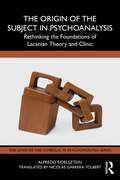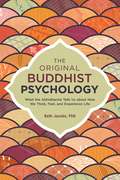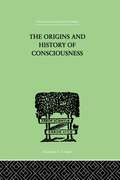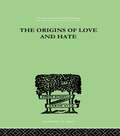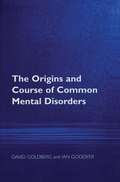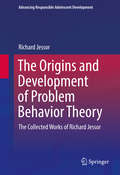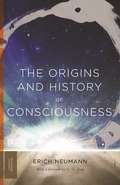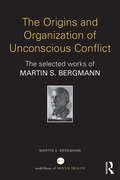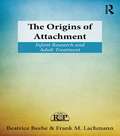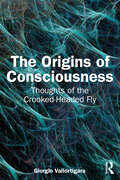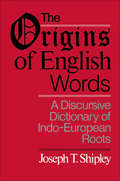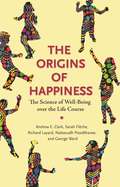- Table View
- List View
The Organization of Action: A New Synthesis
by C.R. GallistelA synthesis of classic and modern neurobehavioral literature dealing with the principles by which complex, purposive, and intelligent behavior is generated, this book features: * papers by C.S. Sherrington, E. von Holst, D.M. Wilson, G. Fraenkel, H. Mittelstaedt, and P. Weiss * clear descriptions of three types of elementary units of behavior -- the reflex, the oscillator, and the servomechanism * a review of the diverse manifestations of hierarchical structure in the neural mechanisms underlying coordinated action. This volume has proven to be of great value to psychologists, neurobiologists, and philosophers interested in the problem of action and how it may be approached in light of modern neurobehavioral research. It has been designed for use as a supplemental text in courses in physiological psychology, neurobiology and behavior, and those courses in cognitive and developmental psychology that place particular emphasis on understanding how complex behavior patterns are implemented.
The Organization of Behavior: A Neuropsychological Theory
by D.O. HebbSince its publication in 1949, D.O. Hebb's, The Organization of Behavior has been one of the most influential books in the fields of psychology and neuroscience. However, the original edition has been unavailable since 1966, ensuring that Hebb's comment that a classic normally means "cited but not read" is true in his case. This new edition rectifies a long-standing problem for behavioral neuroscientists--the inability to obtain one of the most cited publications in the field. The Organization of Behavior played a significant part in stimulating the investigation of the neural foundations of behavior and continues to be inspiring because it provides a general framework for relating behavior to synaptic organization through the dynamics of neural networks. D.O. Hebb was also the first to examine the mechanisms by which environment and experience can influence brain structure and function, and his ideas formed the basis for work on enriched environments as stimulants for behavioral development. References to Hebb, the Hebbian cell assembly, the Hebb synapse, and the Hebb rule increase each year. These forceful ideas of 1949 are now applied in engineering, robotics, and computer science, as well as neurophysiology, neuroscience, and psychology--a tribute to Hebb's foresight in developing a foundational neuropsychological theory of the organization of behavior.
The Organizational Life of Psychoanalysis: Conflicts, Dilemmas, and the Future of the Profession
by Kenneth EisoldThe Organizational Life of Psychoanalysis is a wide-ranging exploration and examination of the organizational conflicts and dilemmas that have troubled psychoanalysis since its inception. Kenneth Eisold provides a unique, detailed, and closely reasoned account of the systems needed to carry out the tasks of training, quality control, community building, and relationships with the larger professional community. He explores how the freedom to innovate and explore can be sustained in a context where the culture has insisted on certain standards being set and enforced, standards that have little to do with providing effective pathways to cure.? Each chapter in this collection addresses a specific dilemma faced by the profession, including: Who is to be in charge of training and who will determine those who succeed the existing leadership?? Which theories and practices are to be approved and which proscribed and censored?? How is the competition with alternative methods, including psychotherapy informed by psychoanalysis, to be managed?? Several chapters are devoted to exploring the reciprocal influence of Freudian psychoanalysis and Jungian Analytical Psychology. Others explore the specific dilemmas and difficulties affecting the field currently, stemming from the massive restructuring of the health care industry and the changes affecting all professions, as they are reshaped into massive organizations no longer marked by personal relationships and individual control. The Organizational Life of Psychoanalysis will be essential reading for psychoanalysts, psychoanalytic psychotherapists, and anyone interested in the future of psychoanalysis as a profession. It will appeal greatly to anyone who has assumed full or partial responsibility for the management of a psychoanalytic institute or association.
The Organizational Psychology of Sport: Key Issues and Practical Applications
by Christopher R. D. WagstaffThis ground-breaking book is the first to provide a comprehensive overview of how organizational psychology can be used to understand and improve performance in elite sport. Using recent theoretical advances from this burgeoning area of research, each chapter offers key conceptual issues and practical insights across a range of topics. The book is structured into four constituent parts, Attitudes and emotions in sports organizations Stress and well-being in sports organizations Behaviors in sports organizations Environments in sports organizations Covering key areas such as attitudes to employment, conflict and change management, leadership, and relationships with the mass media, the book shines a spotlight on how organizational issues play a fundamental role in the experience of individuals and teams. In an era of ever-increasing professionalism in sport, the book provides an invaluable new perspective on performance at the elite level. Including contributions from an international range of academics and practitioners, it will be essential reading for any student or practitioners within sport and exercise psychology.
The Organizational Sweet Spot
by Charles EhinEmployee disengagement is one of the most pressing problems plaguing managers today hampering the innovation capacities of countless organizations. According to recent polls, some 20 percent of workers report feeling disconnected from their jobs, in an environment of stagnating wages, massive layoffs, rising health care costs, and other factors that contribute to alienation, distrust, and apathy. In The Organizational Sweet Spot, Dr. Charles Ehin takes a refreshing new look at what it will take to reengage disaffected workers and boost their resolve to advance novel ideas. Applying the latest research from such fields as evolutionary psychology, social neuroscience, organizational behavior, anthropology, and social network analysis, Ehin demonstrates how employee disengagement is rooted in a fundamental misalignment between people's instinctive drive to develop their personal and group identities through informal or "emergent" relationships and the ways in which organizational goals and profit motives are executed through formal bureaucracy. The challenge for today's organizations--which operate under constantly changing conditions--is to narrow this gap, that is, to find the "sweet spot", where the formal and informal elements of the organization overlap. Ehin provides practical tools for leaders to support this "shared access domain" to improve productivity, catalyze innovation, and inspire exceptional performance. His new model is likely to reverberate throughout current management thinking as we move toward creating more vital and meaningful workplaces.
The Organized Child: An Effective Program to Maximize Your Kid's Potential--in School and in Life
by Richard Gallagher Elana G. Spira Jennifer L. RosenblattAre you sick of nagging your child to write down homework assignments? Is his or her backpack a black hole that eats up papers, books, and gym clothes? Organizational skills problems aren't just frustrating--they get in the way of school success and wreak havoc at home. Fortunately, help is at hand. This unique resource stands out from other books because it is based on a scientifically tested program that works. Learn how you can teach your 7- to 13-year-old specific skills to: *Organize school materials and toys. *Track assignments. *Improve time management and planning. *Overcome brain "Glitches"--mischievous creatures that trip kids up. *Create and follow effective routines. Concrete examples, tips for strategically using praise and rewards, and practical tools (you can download and print additional copies as needed) help you implement each step of the program. Maximizing your kid's potential starts now--here's how. Mental health professionals, see also the related intervention manual from Gallagher et al., Organizational Skills Training for Children with ADHD: An Empirically Supported Treatment.
The Organized Mind: Thinking Straight in the Age of Information Overload
by Daniel J. LevitinNew York Times bestselling author and neuroscientist Daniel J. Levitin shifts his keen insights from your brain on music to your brain in a sea of details.The information age is drowning us with an unprecedented deluge of data. At the same time, we’re expected to make more—and faster—decisions about our lives than ever before. No wonder, then, that the average American reports frequently losing car keys or reading glasses, missing appointments, and feeling worn out by the effort required just to keep up.But somehow some people become quite accomplished at managing information flow. In The Organized Mind, Daniel J. Levitin, PhD, uses the latest brain science to demonstrate how those people excel—and how readers can use their methods to regain a sense of mastery over the way they organize their homes, workplaces, and time.With lively, entertaining chapters on everything from the kitchen junk drawer to health care to executive office workflow, Levitin reveals how new research into the cognitive neuroscience of attention and memory can be applied to the challenges of our daily lives. This Is Your Brain on Music showed how to better play and appreciate music through an understanding of how the brain works. The Organized Mind shows how to navigate the churning flood of information in the twenty-first century with the same neuroscientific perspective.
The Organized Student: Teaching Children the Skills for Success in School and Beyond
by Donna Goldberg Jennifer ZwiebelDonna Goldberg founded the Organized Student, a consulting firm based in New York City, in 1990. Jennifer Zwiebel joined the Organized Student in 2002. Both authors live in New York City. Life is painful for students who don't meet the expectations of their parents, teachers, and peers. Some kids suffer from learning issues and others from disorganization. Whatever the obstacle, its effects are devastating to a child's self-esteem. The root of the problem had nothing to do with the students' intelligence or motivation to do well in school; it had to do with their lack of basic organizational skills. It's important to keep in mind that school today is not the place it was when you were growing up. Students have substantially more work, their days are more fragmented, and there's a pervasive sense of pressure leading students to feel that they can't afford to make mistakes. Advances in technology, overloaded schedules, and changes in family structure mean students are facing a different and often overwhelming world. If you and your child invest the time it takes to organize sup¬plies, homework, and a study schedule, you can create the structure that he needs to succeed. While this book offers many different strategies and systems for getting organized, they will work only if you communicate openly with your child without being critical. Everyone learns differently and each student will come up with his own "right answers." It's vital that you recognize the importance of maintaining a non-judgmental attitude and that you address each situation with an open mind, a positive approach, and no eye rolling. The fastest way to end an organizing session with your child is to criticize him. Keep your eye on the long-term goal and don't get distracted by a failed test or a notebook full of doodles. When you learn to stay focused and listen for the problems, you will discover that a solution can always be worked out.
The Orienting Reflex in Humans: An International Conference Sponsored by the Scientific Affairs Division of the North Atlantic Treaty Organization (Psychology Revivals)
by H. D. Rimmel; E. H. van Olst; J. F. OrlebekeOriginally published in 1979, the world’s leading researchers contributed chapters describing their work on the orienting reflex in humans. The contributions, at the time current and comprehensive, in a sense that each facet of contemporary research was represented, address the orienting reflex, now recognized as a fundamental component of human learning and cognitive function. The authors contributing to this volume emphasize both theoretical and methodological issues, as well as present more empirical research. Here is a volume that spans all current work on the orienting reflex in humans, both basic and applied, from the laboratory as well as clinical data, and which would be of immense interest to psychologists, psychophysiologists, psychiatrists, physiologists, and all others interested in this fascinating topic.
The Orienting Response in Information Processing
by Heikki Lyytinen Risto Naatanen Evgeni N. Sokolov John SpinksThis book is a testimony to Evgeny Nikolaevich Sokolov's years of work in developing knowledge in the areas of perception, information processing and attention, and to the research it has spawned. It presents a historical account of a research program, leading the reader toward a cognitive science approach to the study of perception and attention. An understanding of neuroscience and mathematical modeling are helpful prerequisites. The co-authors collected data on orienting, attention, and information processing in the brain using single-cell recordings, central, autonomic, cognitive, behavioral, and verbal measures. This commonality brought them together for a series of meetings which resulted in the production of this book. The book ends with a review of some of the co-authors studies that have developed from or in parallel with Sokolov's research. They investigate, in particular, the concepts of attention and anticipation using a psychophysiological methodology.
The Origin of Consciousness in the Breakdown of the Bicameral Mind (Pelican Ser.)
by Julian JaynesNational Book Award Finalist: &“This man&’s ideas may be the most influential, not to say controversial, of the second half of the twentieth century.&”—Columbus Dispatch At the heart of this classic, seminal book is Julian Jaynes's still-controversial thesis that human consciousness did not begin far back in animal evolution but instead is a learned process that came about only three thousand years ago and is still developing. The implications of this revolutionary scientific paradigm extend into virtually every aspect of our psychology, our history and culture, our religion—and indeed our future. &“Don&’t be put off by the academic title of Julian Jaynes&’s The Origin of Consciousness in the Breakdown of the Bicameral Mind. Its prose is always lucid and often lyrical…he unfolds his case with the utmost intellectual rigor.&”—The New York Times &“When Julian Jaynes . . . speculates that until late in the twentieth millennium BC men had no consciousness but were automatically obeying the voices of the gods, we are astounded but compelled to follow this remarkable thesis.&”—John Updike, The New Yorker &“He is as startling as Freud was in The Interpretation of Dreams, and Jaynes is equally as adept at forcing a new view of known human behavior.&”—American Journal of Psychiatry
The Origin of the Idea of Chance in Children (Psychology Revivals)
by Jean Piaget Barbel InhelderAlthough originally published in France in 1951 this English translation was not published until 1975. The book supplements the authors’ previous publications on the development of thought in the child and is the result of two preoccupations: how thought that is in the process of formation acts to assimilate those aspects of experience that cannot be assimilated deductively – for example, the randomly mixed; and the necessity of discovering how the mental processes work in the totality of spontaneous and experimental searchings that make up what is called the problem of ‘induction’. Induction is a sifting of our experiences to determine what depends on regularity, what on law, and what on chance. The authors examine the formation of the physical aspects of the notion of chance; they study groups of random subjects and of ‘special’ subjects; and they analyse the development of combining operations which contributes to determining the relationship between chance, probability, and the operating mechanisms of the mind.
The Origin of the Subject in Psychoanalysis: Rethinking the Foundations of Lacanian Theory and Clinic (The Lines of the Symbolic in Psychoanalysis Series)
by Alfredo EidelszteinThis highly original work uses the Big Bang theory as a conceptual tool to address the question of the origin of the subject in psychoanalysis.The Origin of the Subject in Psychoanalysis elucidates the radical discontinuity between Freud and Lacan in the foundations of their psychoanalytic theories and conceptions of the clinic. Alfredo Eidelsztein argues that just as physics conceives the origin of matter, energy and space-time as an absolute beginning, so the appearance of the symbolic order and the subject must be understood as an “ex-nihilo creation” that excludes any form of causal relationship between the “before” and the “after.” He argues that this is a major conceptual difference between Freud and Lacan: the dimension of the signifier, beginning with its appearance, marks an absolute discontinuity from what was before and asserts itself as the condition from which, for the human realm, reality and experience are given. Eidelsztein’s conceptions regarding the origin of the subject, the Big Bang of language and speech, and its discontinuity with the biological body establish the basis on which the psychoanalytic clinic should be sustained.Written in clear and straightforward prose, The Origin of the Subject in Psychoanalysis will be of great interest to scholars of Lacanian psychoanalysis and to Lacanian analysts in practice and in training.
The Original Buddhist Psychology: What the Abhidharma Tells Us About How We Think, Feel, and Experience Life
by Beth JacobsThe Abhidharma, one of the three major text collections of the original Buddhist canon, frames the psychological system of Buddhism, explaining the workings of reality and the nature of the human mind. It is composed of detailed matrixes and lists that outline the interaction of consciousness and reality, the essence of perception and experience, and the reasons and methods behind mindfulness and meditation. Because of its complexity, the Abhidharma has traditionally been reserved only for academic or monastic study; now, for the first time, clinical psychologist Beth Jacobs brings this dynamic body of work to general readers, using practical explanation, personal stories, and vivid examples to gently untangle the technical aspects of the Abhidharma. Drawing on decades of experience as both a therapist and a Buddhist, Jacobs illuminates this classic area of Buddhist thought, highlighting the ways it can broaden and deepen our experience of the human psyche and offering profound insights into spiritual practice.
The Origins And History Of Consciousness (Bollingen Ser. #Vol. 42)
by Neumann, ErichFirst Published in 1999. Routledge is an imprint of Taylor & Francis, an informa company.
The Origins Of Love And Hate (Key Texts In The Psychology Of Health And Illness)
by Suttie, Ian DFirst published in 1999. Routledge is an imprint of Taylor & Francis, an informa company.
The Origins and Course of Common Mental Disorders
by Ian M Goodyer Prof David GoldbergWhy are some people more vulnerable to common mental disorders than others? What effects do genes and environments exert on the development of mental disorders? The Origins and Course of Common Mental Disorders describes the nature, characteristics and causes of common emotional and behavioural disorders as they develop across the lifespan, providing a clear and concise account of recent advances in our knowledge of the origins and history of anxious, depressive, anti-social, and substance related disorders. Combining a lifespan approach with developments in neurobiology, this book describes the epidemiology of emotional and behavioural disorders in childhood, adolescence and adult life. David Goldberg and Ian Goodyer demonstrate how both genes and environments exert different but key effects on the development of these disorders and suggest a developmental model as the most appropriate for determining vulnerabilities for psychopathology. Divided into four sections, the book covers: the nature and distribution of common mental disorders the biological basis of common disorders the human life cycle relevant to common disorders the developmental model. This highly readable account of the origins of emotional and behavioural disorders will be of interest to behavioural science students and all mental health professionals including psychiatrists, psychologists, social workers, nurses, and counsellors.
The Origins and Development of Problem Behavior Theory
by Richard JessorThis book, the first in a series of collected works, traces the evolution of Problem Behavior Theory from its inception to its current status as a widely used framework for understanding and addressing risky behavior in youth and young adults. The theory is explored from its beginnings as a study of deviant behavior and alcohol abuse in a tri-ethnic community through its expansion to include psychosocial aspects of development, risk and protective factors, and health behavior in the larger societal context of youth behavior. In its current form, Problem Behavior Theory constitutes an interdisciplinary approach to research personal and societal factors that are involved in both normative and problematic behavior. Chapters highlight the many contributions of the theory to social science and its potential for informing evidence-based intervention and prevention programs for youth and young adults. Topics featured in this book include: The Tri-Ethnic Community Study. The Socialization of Problem Behavior in Youth Study. The Young Adult Follow-up Study. The problem behavior syndrome. The cross-national generality of Problem Behavior Theory. Problem Behavior Theory and adolescent pro-social behavior. The Origins and Development of Problem Behavior Theory is a must-have resource for researchers/professors, clinicians, and related professionals as well as graduate students in social and developmental psychology, criminology/criminal justice, public health, social work, and related disciplines.
The Origins and History of Consciousness (Bollingen Series #760)
by Erich NeumannThe Origins and History of Consciousness draws on a full range of world mythology to show how individual consciousness undergoes the same archetypal stages of development as human consciousness as a whole. Erich Neumann was one of C. G. Jung's most creative students and a renowned practitioner of analytical psychology in his own right. In this influential book, Neumann shows how the stages begin and end with the symbol of the Uroboros, the tail-eating serpent. The intermediate stages are projected in the universal myths of the World Creation, Great Mother, Separation of the World Parents, Birth of the Hero, Slaying of the Dragon, Rescue of the Captive, and Transformation and Deification of the Hero. Throughout the sequence, the Hero is the evolving ego consciousness.Featuring a foreword by Jung, this Princeton Classics edition introduces a new generation of readers to this eloquent and enduring work.
The Origins and Organization of Unconscious Conflict: The Selected Works of Martin S. Bergmann
by Martin S. BergmannThe Origins and Organization of Unconscious Conflict provides a comprehensive set of contributions by Martin S. Bergmann to psychoanalytic theory, technique, and its applications. Following a general approach, Bergmann synthesizes Freud’s major contributions, the development of his thinking, the ramifications to present day psychoanalytic theory and practice and finally, discusses unresolved problems requiring further work. In these selected papers, profound meditations are offered on love and death, the leap from hysteria to dream interpretation in Freud’s intellectual development, the genetic roots of Psychoanalysis in the creative clash between Enlightenment and Romantic ideas, old age as a clinical and theoretical phenomenon, the death instinct as clinical controversy, and the interminable debate about termination in psychoanalysis and how to effect it. Crucial clinical and theoretical questions are constantly addressed and the challenges they pose will engage and enlighten the reader. Bergmann was a philosopher of mind as much as he is a psychoanalyst and the range and scope of the ideas in these selected papers is impressive, instructive and illuminating. Bergmann deals with psychoanalysis as a science, and with an ideology, referring to psychoanalysis as a "Weltanschauung", a philosophical basis for psychoanalytic theory. He presents an original, penetrating analysis of Freud’s inner struggle, about empirical research, validation and related to five other sciences; about irrational forces that constitute major motivators of human life, and require taking an existential position regarding their implications, the search for the meaning of one’s existence. The Origins and Organization of Unconscious Conflict is an exciting intellectual journey of the scientific and ideological aspects of psychoanalysis and the study of love. It will appeal to psychoanalysts, psychologists, philosophers and both undergraduate and postgraduate students studying in these fields, as well as anyone with an interest in mental health and human behaviour.
The Origins of Attachment: Infant Research and Adult Treatment (Relational Perspectives Book Series)
by Frank M. Lachmann Beatrice BeebeThe Origins of Attachment: Infant Research and Adult Treatment addresses the origins of attachment in mother-infant face-to-face communication. New patterns of relational disturbance in infancy are described. These aspects of communication are out of conscious awareness. They provide clinicians with new ways of thinking about infancy, and about nonverbal communication in adult treatment. Utilizing an extraordinarily detailed microanalysis of videotaped mother-infant interactions at 4 months, Beatrice Beebe, Frank Lachmann, and their research collaborators provide a more fine-grained and precise description of the process of attachment transmission. Second-by-second microanalysis operates like a social microscope and reveals more than can be grasped with the naked eye. The book explores how, alongside linguistic content, the bodily aspect of communication is an essential component of the capacity to communicate and understand emotion. The moment-to-moment self- and interactive processes of relatedness documented in infant research form the bedrock of adult face-to-face communication and provide the background fabric for the verbal narrative in the foreground. The Origins of Attachment is illustrated throughout with several case vignettes of adult treatment. Discussions by Carolyn Clement, Malcolm Slavin and E. Joyce Klein, Estelle Shane, Alexandra Harrison and Stephen Seligman show how the research can be used by practicing clinicians. This book details aspects of bodily communication between mothers and infants that will provide useful analogies for therapists of adults. It will be essential reading for psychoanalysts, psychotherapists and graduate students. Collaborators Joseph Jaffe, Sara Markese, Karen A. Buck, Henian Chen, Patricia Cohen, Lorraine Bahrick, Howard Andrews, Stanley Feldstein Discussants Carolyn Clement, Malcolm Slavin, E. Joyce Klein, Estelle Shane, Alexandra Harrison, Stephen Seligman
The Origins of Consciousness: Thoughts of the Crooked-Headed Fly
by Giorgio VallortigaraThe Origins of Consciousness challenges the dominant view that consciousness is an emergent property of the complex human brain.Based on his pioneering research on a variety of organisms, Vallortigara argues that the most basic forms of mental life do not require large brains, and that the neurological surplus observed in some animals such as humans is likely at the service of memory storage, not of the processes of thought or, even less, of consciousness. The book argues for a simple neural mechanism that can provide the crucial event that brings into effect the minimum condition for subjective experience. Implications of the hypothesis for the appearance of consciousness in different organisms are discussed, as well as links with a variety of fascinating human phenomena such as disorders of consciousness, tickling and visual illusions.Challenging widely accepted theories of consciousness, the book is a must-read for students and researchers of human and animal consciousness.
The Origins of English Words: A Discursive Dictionary of Indo-European Roots
by Joseph Twadell ShipleyThere are no direct records of the original Indo-European speech. By comparing the vocabularies of its various descendants, however, it is possible to reconstruct the basic Indo-European roots with considerable confidence. In The Origins of English Words, Shipley catalogues these proposed roots and follows the often devious, always fascinating, process by which some of their offshoots have grown.Anecdotal, eclectic, and always enthusiastic, The Origins of English Words is a diverting expedition beyond linguistics into literature, history, folklore, anthropology, philosophy, and science.
The Origins of Happiness: The Science of Well-Being over the Life Course
by Andrew Clark Richard Layard Sarah Flèche Nattavudh Powdthavee George WardA new perspective on life satisfaction and well-being over the life courseWhat makes people happy? The Origins of Happiness seeks to revolutionize how we think about human priorities and to promote public policy changes that are based on what really matters to people. Drawing on a range of evidence using large-scale data from various countries, the authors consider the key factors that affect human well-being, including income, education, employment, family conflict, health, childcare, and crime. The Origins of Happiness offers a groundbreaking new vision for how we might become more healthy, happy, and whole.
